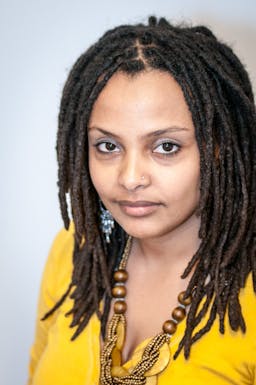Lessons I've learned from giving a workshop on citizen journalism
Jan 21, 2015
Story
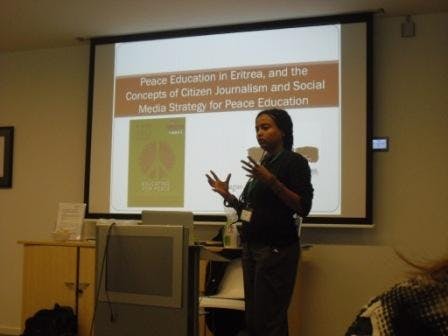
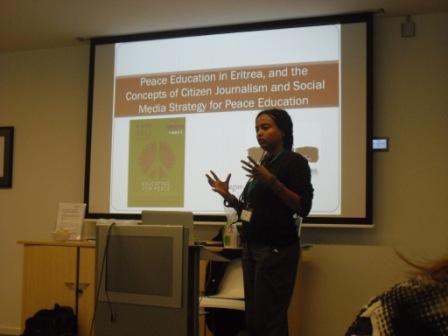
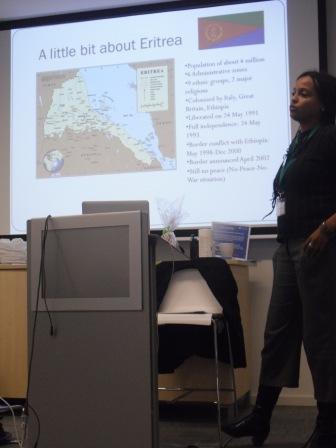
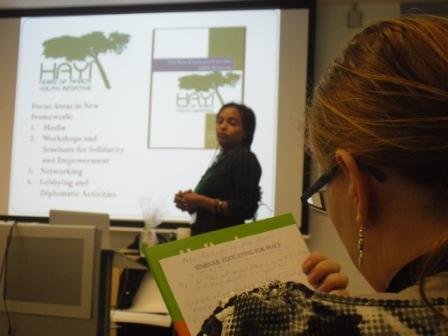
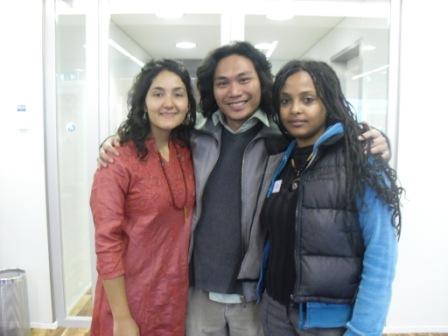
Dear Friends,
Greetings from Asmara!
Last month, I told you about how I had planned to give a workshop on citizen journalism during a Peace Education conference I attended in The Netherlands. It wasn’t so much of a workshop than a talk, a sort of 101 on citizen journalism. Due to the weather and other workshops that were happening simultaneously, there weren’t too many participants and I’ve come to learn that the training session required from us for our module 6 assignment should last at least several days if we want to make a proper impact.
I can’t believe they referred to me as an expert of new media, but you may find a brief report about the conference here: http://www.unoy.org/unoy/blog/unoy-news/newsletter/2012/02/unoy-organizi.... There were a total of 12 participants in the workshop, 10 out of which were women between the age of 25-59 years old (the other two participants were men in the same age range). I didn’t ask each participant their age, but surely they were all under 30 years of age.
Besides the lack of time, I found it particularly challenging to convince a group of mostly Europeans of the various challenges youth in the Horn of Africa have when it comes to having their voice heard, as well as the challenges they face due to digital divide. I wanted to portray a message of the smart use of new media for social change, and how young people should be weary of the lack of commitment new media might entice. It is difficult to convince people of these challenges when they have almost unlimited access to internet at their homes and work as well as on their mobile phones. Through the discussions revolved around the workshop, I learned that a young woman who grew up in Mozambique, a young woman from Palestine and a young man from the Philippines were able to relate to the things I was talking about much more than the Dutch participants, which tells me that there are different viewpoints and practices between the Global North and Global South when it comes to how they use new media and how they may act as citizen journalists.
A good portion of my workshop time was dedicated to talking about peace education in my country Eritrea, but I had talked about it mostly in terms of what my organization does at a regional level (Peace education is already well engrained in the culture of my organization, and our peacebuilding efforts target other young people throughout the region). Prior to the workshop, I had asked participants to tell me what they knew about the Horn of Africa; I didn’t think that they would know that much, but still I was so surprised at how little they knew. I had to debrief them about the situation in my country, as well as the many conflicts taking place in the Horn. I had also shown them samples of the writings of citizen journalists from the Horn, particularly posts they had written concerning irresponsible journalism, the overwhelming bias of how and what is reported on Africa, as well as the lack of real information being provided about the very real issues taking place in the region.
Two young women (the one from Palestine and another young woman from Spain) went out of their way to talk to me after the workshop. They said that they found the concepts of citizen journalism to be particularly interesting and that they would love it if I would email them more information about it. During the workshop, I had told the participants about World Pulse, and even showed them the World Pulse Magazine. I continued to tell these young women about the Pulse Wire initiative and gave them by correspondent business card! I should carefully follow up on this, and make sure they join the Pulse Wire community.
Anyway, to briefly list down the lessons I’ve learned from this experience:
- We should take into consideration the needs and standpoints of our workshop participants before conducting the workshop so that we can cater to their specific needs. To try to develop some sort of empathy about the challenges of digital divide with those who don’t experience it is tough!
- Considering the amount of impact you’d like to have on the participants, give your workshop enough time! It will be difficult if you lack the resources and space, but really take into consideration the impact you’d like to have on the participants. If you’re planning to just introduce them to World Pulse, it shouldn’t take too much time and energy. But if you like me who have to take into consideration digital divide, then you would probably want to give a more comprehensive training on citizen journalism concepts, new media tools, etc.
These things are also stated in the Module 6 material, but through my own experience, these two things were particularly important issues. Note that I used the opportunity of participating in the peace education conference to talk about citizen journalism but I wasn’t intending to use the experience as my Module 6 assignment. It did prove to be a great preview of the great assignment I can organize during our last phase of this amazing World Pulse journey!
Oh! Before I forget, I had mentioned that the other woman who is part of the International Steering Committee of UNOY Peacebuilders with me is also highly knowledgeable on traditional healing and the power of the feminine. We had great discussions about this, and I told her all about World Pulse. I even let her borrow my World Pulse magazine for a few days, and gave her one of my correspondent business cards. A truly awesome young lady, I’m going to direct her to the Pulse Wire community ASAP!
